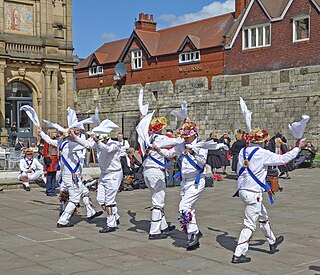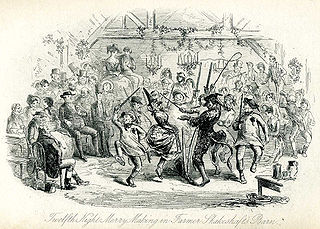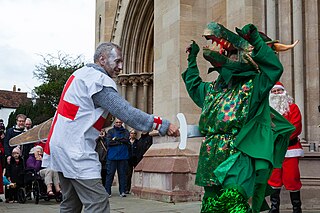
Lammas, also known as Loaf Mass Day, is a Christian holiday celebrated in some English-speaking countries in the Northern Hemisphere on 1 August. The name originates from the word "loaf" in reference to bread and "Mass" in reference to the Eucharist. It is a festival in the liturgical calendar to mark the blessing of the First Fruits of harvest, with a loaf of bread being brought to the church for this purpose. Lammastide falls at the halfway point between the summer solstice and the autumn equinox. Christians also have church processions to bakeries, where those working therein are blessed by Christian clergy.

Morris dancing is a form of English folk dance. It is based on rhythmic stepping and the execution of choreographed figures by a group of dancers in costume, usually wearing bell pads on their shins and/or shoes. A band or single musician, also costumed, will accompany them. Sticks, swords, handkerchiefs, and a variety of other implements may be wielded by the dancers.

Corn dollies or corn mothers are a form of straw work made as part of harvest customs of Europe before mechanisation.
Ziemassvētki, also Ziemsvētki is an annual festival in Latvia which observes the winter solstice and birth of Jesus Christ. Latvians around the world celebrate it from 24 to 25 December. 24 December is Ziemassvētku vakars, 24 December is Ziemassvētku vakars, while 25 December is Pirmie Ziemassvētki, 26 December Otrie Ziemassvētki. Christianity traditionally celebrates the birthday of Jesus Christ on 25 December, according to the Julian calendar, but Orthodox churches follow the Eastern Orthodox liturgical calendar and, as a result, the majority of Orthodox churches celebrate Ziemassvētki on 6, 7 and 8 January.

Molly dancing is a form of English Morris dance, traditionally done by out-of-work ploughboys in midwinter in the 19th century. It was largely ignored by folk dance collectors, who recorded only a handful of dances before the practice died out in the 1930s. The practice was revived in the 1970s.

Saint Stephen's Day, also called the Feast of Saint Stephen, is a Christian saint's day to commemorate Saint Stephen, the first Christian martyr or protomartyr, celebrated on 26 December in Western Christianity and 27 December in Eastern Christianity. The Eastern Orthodox churches that adhere to the Julian calendar mark Saint Stephen's Day on 27 December according to that calendar, which places it on 9 January of the Gregorian calendar used in secular contexts. In Latin Christian denominations, Saint Stephen's Day marks the second day of Christmastide.

The Abbots Bromley Horn Dance is a folk dance which takes place each September in the village of Abbots Bromley in Staffordshire, England. It is performed by ten dancers, accompanied by a musician playing an accordion and a youth with a triangle. Six of the dancers carry reindeer horns; the remaining four are a hobby horse, Maid Marian, a fool, and a youth with a bow and arrow. On Wakes Monday, beginning early in the morning at the parish church where the horns are stored, the performers dance around the parish all day.

Whittlesey is a market town and civil parish in the Fenland district of Cambridgeshire, England. Whittlesey is 6 miles (10 km) east of Peterborough. The population of the parish was 17,667 at the 2021 Census.

Twelfth Night is a Christian festival on the last night of the Twelve Days of Christmas, marking the coming of the Epiphany. Different traditions mark the date of Twelfth Night as either 5 January or 6 January, depending on whether the counting begins on Christmas Day or 26 December. January 6 is celebrated as the feast of Epiphany, which begins the Epiphanytide season.

Epiphany, or Eid al-Ghitas, also known as "Theophany" in Eastern Christian tradition, is a Christian feast day commemorating the visit of the Magi, the baptism of Jesus, and the wedding at Cana.

Plough Sunday is a traditional English celebration of the beginning of the agricultural year that has seen some revival over recent years. Plough Sunday celebrations usually involve bringing a ploughshare into a church with prayers for the blessing of the land. It is traditionally held on the Sunday after Epiphany, the Sunday between 7 January and 13 January. Accordingly, work in the fields did not begin until the day after Plough Sunday: Plough Monday. Although the nature of farming has changed over the centuries, Plough Sunday is seen as a way of generally celebrating farming and the work of farmers. In the Church of England book of liturgy, Common Worship: Times and Seasons, there is a suggested prayer for the "Blessing of the Plough", for the "Blessing of Seed" and passages of Scripture related to the agricultural theme.

Malanka is a Ukrainian folk holiday celebrated on 31 December, which is New Year's Eve in accordance with the Gregorian calendar, formerly it was celebrated on 13 January corresponding to 31 December in the Julian calendar. The festivities were historically centred around house-to-house visiting by groups of young men, costumed as characters from a folk tale of pre-Christian origin, as well as special food and drink. The context of the rituals has changed, but some elements continue to the present.

Star singers, also known as Epiphany singers, or Star boys' singing procession (England), are children and young people walking from house to house with a star on a rod and often wearing crowns and dressed in clothes to resemble the Three Magi. The singing processions have their roots in an old medieval ecclesiastical play, centred on the Biblical Magi of the Christmas story in the Gospel of Matthew, appropriate to Epiphany. It is observed usually during the period between 27 December and 6 January.

A straw bear is a traditional character that appears in carnival processions or as a separate seasonal custom in parts of Germany, mainly at Shrovetide but sometimes at Candlemas or Christmas Eve.

In folklore, a hobby horse is a costumed character that features in some traditional seasonal customs, processions and similar observances around the world. In England, they are particularly associated with May Day celebrations, mummers' plays and the Morris dance.

The name horkey was applied to end of harvest customs and celebrations, especially in the Eastern Counties of England, although the word occurred elsewhere in England and also Ireland. Since it is found in dialect, there is no standard spelling and other versions include hawkie and hockey. Mentioned from the 16th century onward, the custom became less common during the course of the 19th century and was more or less extinct in the 20th. It is chiefly remembered now because of the poem dedicated to it by Robert Bloomfield in 1802.
Dancing England was a series of showcase traditional dance concerts held at the Derby Assembly Rooms from 1979 to 1987. They were devised and curated by Phil Heaton and John Shaw, members of the Black Cap Sword Dancers, and two very notable characters on the Nottingham and Derby folk and dance scene of the 1970s. Dancing England was set up to showcase the best of traditional dance in the UK, along with unique and/or interesting folk customs to celebrate the UK's wide cultural heritage.
England traditionally celebrates a number of Christian and secular festivals. Most are observed throughout the country but some, such as Oak Apple Day, Souling, Rushbearing, Bawming the Thorn, and Hocktide, are local to certain regions.

Mummers' plays are folk plays performed by troupes of amateur actors, traditionally all male, known as mummers or guisers. Historically, mummers' plays consisted of informal groups of costumed community members that visited from house to house on various holidays. Today the term refers especially to a play in which a number of characters are called on stage, two of whom engage in a combat, the loser being revived by a doctor character. This play is sometimes found associated with a sword dance though both also exist in Britain independently.
The Goathland Plough Stots are a team of Long Sword Dancers based in the village of Goathland, North Yorkshire, England. The traditional dance that they perform had died out by the start of the twentieth century but was revived in 1922. The team were expelled from the Morris Ring for allowing women to be trained in the art of the dance, the tradition being that it is a male-only dance. The Goathland Plough Stots dance is recognised as one of the oldest in England, with a history dating back more than a thousand years.



















